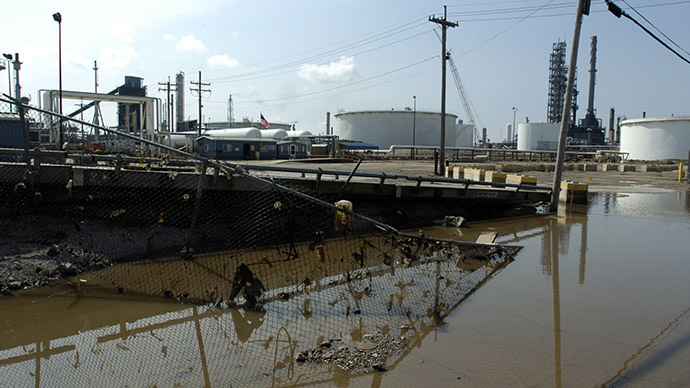‘Strong correlation’ between quakes and fracking in Kansas – official

Geologists in the state of Kansas now say that a recent string of mysterious earthquakes may have been caused by pumping chemicals into the ground as part of the controversial gas and oil extraction process known as hydraulic fracturing, or fracking.
Geologists in the state of Kansas say that a recent string of mysterious earthquakes may have been caused by pumping chemicals into the ground as part of the controversial gas and oil extraction process known as hydraulic fracturing, or fracking.
Rick Miller, a geophysicist and senior scientist for the Kansas Geological Survey, told the Lawrence Journal-World recently that he believes the injection of fracking chemicals into the earth has been a catalyst for the quakes.
“We can say there is a strong correlation between the disposal of saltwater and the earthquakes,” Miller told the paper.
The Journal-World first published their piece with Miller over the weekend, and it reported that state geologists now say for the first time that fracking is responsible for recent tremors.
On Monday – two days after the paper published its report – the Wichita Eagle reported that four small quakes occurred in the southern part of the state and through neighboring Oklahoma earlier that morning.
A separate study that was cited – published by the journal Science last summer and authored by researchers from Cornell University and the University of Colorado – determined that approximately one-fifth of all the earthquakes that have occurred recently in the central and eastern United States were caused by activity at just four fracking wells situated near the town of Jones, Oklahoma.
Kansas quakes likely caused by oil and gas fracking process http://t.co/2FFsNbhiKipic.twitter.com/plg798HItu
— LJWorld (@LJWorld) January 19, 2015
Like Kansas, Oklahoma saw an increase in tremors in recent years, going from one significant quake a year in 2008 to 230 as of July.
Last year, Kansas encountered more than 120 earthquakes, the Associated Press reported this week; in 2012, the state saw none.
Joe Spease, the chairman of the Kansas Sierra Club's fracking committee, told the wire agency that state lawmakers should impose a moratorium on fracking until plans can be adopted with regards to the cocktail of chemicals routinely injected into the Earth in order to extract natural resources.
“If the government and the Kansas Corporation Commission care about the people of Kansas and the damages, they will order a moratorium,” Spease said. “If they only care about the profits of the oil and gas [industry], it will be business as usual. I hope that is not the case.”
Rex Buchanan, director of the Kansas Geological Survey, told AP that he doesn’t think fracking is necessarily to blame, but instead raised concern about the waste water used during drilling operations.
“If someone were to say these earthquakes were caused by fracking, there might be one or two, but there is no evidence for it,” Buchanan said. “The issue of saltwater disposal is completely different.”
#kansas#earthquakes likely caused by #fracking process http://t.co/qmu4kcWs9E#ksleg#koch@AFPKansas#p2#brownbackpic.twitter.com/tyemSqsKoR
— MichaelLoBurgio (@MikeLoBurgio) January 19, 2015
Dr. Ken Carlson, a professor of environmental engineering at Colorado State University, also highlighted concerns over fracking waste water leaking into the environment.
“Waste water form oil and gas operations is filled with toxic compounds,” Dr. Ken Carlson, a professor of environmental engineering at Colorado State University, told RT this week, “and whether there is fracking fluid used or not, this is a water that is something that we’d want to certainly not drink, and really not release directly into a natural environment.”
“If you’re going to your gas station, you wouldn’t ever think about taking a compound or the gasoline and certainly not drinking or even releasing it,” Dr. Carlson said.
Meanwhile, a report published in the peer-reviewed journal Environmental Science & Technology earlier this month alleged that the waste product created by drilling operations contain two potentially hazardous contaminants that have not previously been associated with the ever-growing fracking industry.
Kansas officials link surge in #earthquakes to #fracking waste disposal http://t.co/lY2uYXXr9X#derp#ksleg#kochpic.twitter.com/JWh3IkOihI
— MichaelLoBurgio (@MikeLoBurgio) January 19, 2015
According to a team of scientists working under Duke University geochemistry professor Avner Vengosh, wastewater associated with fracking sites contains large amounts of ammonium and iodide, which may in turn encourage the formation of certain carcinogenic byproducts.
“We were not aware that they existed in oil and gas waste products,” Vengosh told ThinkProgress. “Until now, no one was aware — no one was monitoring for those contaminants.”
“The relatively high frequency of spills associated with the intensity of shale gas development and reports of an overall increase of the salinity in watersheds associated with hydraulic fracturing activities, combined with data presented in this study, suggest that the release of [oil and gas wastewater] to the environment is one of the major risks associated with the development of hydraulic fracturing,” the study reads. “Our findings indicate that discharge and accidental spills of [oil and gas wastewater] to waterways pose risks to both human health and the environment.”
As RT reported previously, a separate study published earlier this month determined that fracking in an Ohio community caused 77 earthquakes during a span of just a few days last March.












